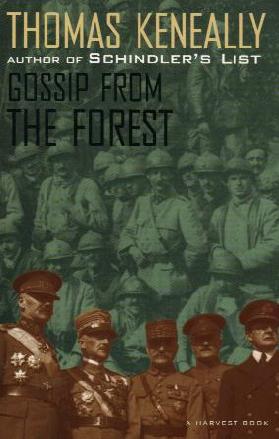
Thomas Keneally
1975

|
Gossip from the Forest Thomas Keneally 1975 |
Dustjacket synopsis:
"The unimaginable slaughter that has become the First World War has continued unabated since
August 1914, and now, in the late fall of 1918, on an obscure railway siding at Compiègne,
France, a group of intractable old men gather to negotiate an armistice. With Allied
victory a certainty, monumental old Marshall Foch, flanked by Maxime Weygand and British
Admiral Wemyss, seeks to crush the enemy at the negotiating table. With the Kaiser in
seclusion, idealist Matthias Erzberger has been dispatched to pick what shards of mercy he
can from the wreckage of the old order. As the Allied leaders press for total submission,
Erzberger, haunted by the prospect of famine and revolution in the gathering German winter,
angles for better terms. And so they talk on and on, as the guns roar and men continue to
die.
"With the acute historical sensibility that is the hallmark of his work, Thomas Keneally has re-created the forging of the armistice in an illuminating and intimate portrayal of personal prejudice and political obstinacy."
Quotes:
"Thomas Keneally's Gossip from the Forest belongs with... Solzhenitsyn's August
1914, [both] books that delineate the past in sympathetic depth and so urge the
reader to enter it." - The New York Times Book Review
"Bravura has been the breath of life to Thomas Keneally. In this books he sets himself, with his
usual passionate exuberance, to study the conjunction of men who met in the railway coaches in the
forest of Compiègne to sign the 1918 Armistice." - Anne Duchêne, The Times Literary Supplement
"The novel is technically a tour-de-force, entirely gripping and . . . . very moving." - C.J. Driver Guardian
"With the sweeping perceptiuon most historians miss he's worked history, speculation, rumour into the cunningest of
documentaries. All in all, an extremely gripping, as well as important historical fiction." - Valerie Cunningham,
New Statesman
"Mr Keneally has intricate mastery over the matters of fact, but it is the heat of his imagination that
astonishes. Dreams, spasms of feeling, lightning analyses of life-long characteristics are merged with history's
fixed assertions, and seem at least as valid in this totally assured book." - Mary Sullivan, Sunday Telegraph
First Paragraph:
On Wednesday afternoon, at his headquarters in Senlis, the Marshal had a visit from the Premier of France. They read through the agenda of the meeting in the forest. When that business was finished, the premier wanted to chat. The Marshall could tell that the old man was secretly seeking reassurance. In spite of that need, the Premier did not abandon his tone of mocking.
They sat by the fire in the Marshal's office on the ground floor. The Marshal's armies went forward up every main and country road. although they were not used to such movement they had no need to appeal to him. Therefore few staff and liaison officers infested the park, no staff limousines cluttered the gravel under the terraces. Without hard-driven generals to salute, the chasseurs at the main steps kept a sleepy watch all afternoon. It was quiet enough and dim enough in the drizzling park to throw the nightjars into disorder. They sat in a birch tree from noon onwards, calling endlessly.
From the Harcourt Brace paperback edition, 1985.
Notes:
This novel was shortlisted for the 1975 Booker Prize.
You can read a brief review of the novel by
Danny Yee.
This page and its contents are copyright © 1998-2005 by Perry Middlemiss, Melbourne, Victoria, Australia.
Last modified: October 18, 2005.